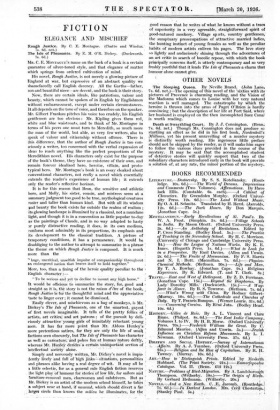FICTION
ELEGANCE AND MISCHIEF
MR. C. E. MONTAGUE'S name on the back of a book is a certain guarantee of silver-toned style, and that elegance of matter
which springs from ordered cultivation of mind.
His novel, Rough Justice, is not merely a glowing picture of
England at war, but expressive of an abstract quality we shamefacedly call English decency. All the Garths-father, son and beautiful niece-are decent, and the book is their story. Now, there are certain ideals, like patriotism, valour and
beauty, which cannot be spoken of in English by Englishmen without embarrassment, except under certain circumstances.
It all depends on the tone of voice, and therefore on the speaker. Mr. Gilbert Frankau pitches his voice too crudely, his English gentlemen are too obvious : Mr. Kipling gives them red,
white and blue waistcoats, and to think of Mr. Montague in terms of his peers one must turn to Meredith, so much more
the man of the world, but able, as very few writers, also to speak of valour and citizenship without offence. There is -
this difference, that the author of Rough Justice is too con- sciously a writer, too concerned with the verbal expression of ideas to reach anything like the perfect proportions of the
Meredithian novel. His characters only exist for the purpose of the book's theme, they have no existence of their own, and remain forever idealized hero, heroine, villain, and proto- typical hero. Mr. Montague's book is an essay cloaked about conventional characters, not really a novel which essentially extends the reader's experience of human life ; it extends only the reader's reflective horizon. It is for this reason that Bron, the sensitive and athletic hero, and Molly, his sister, cousin, and mistress seem at a summary judgment too good to be true, mythological creatures rosier and taller than human kind. But with all its wisdom
and beauty the book exists far outside the realms of realism ; its glowing landscape is illumined by a classical, not a mundane light, and though it is in a convention as little popular to-day as the paintings of Claude, and in no way adapted to hasty
Dr purely distractive reading, it does, in its own medium, conform most admirably in its proportions, its emphasis and its development to the classical tradition. A picture of temporary conditions, it has a permanence. It would be
disobliging to the author to attempt to summarize in a phrase the theme on which Rough Justice is composed. It is much more than the huge, uncritical, unselfish impulse of companionship- throughout an endangered nation that braces itself to hold together."
More, too, than a fixing of the heroic quality peculiar to the English character :-
" To be serious and yet to decline to mount any high horse." It would be officials to summarize the story, for, good and straight as it is, the story is not the raison d'gtre of the book. Rough Jiciticels'foi'the thoughtful mind and the appreciative taste to linger over ; it cannot be dismissed. Easily clever, and mischievous as a bag of monkeys, is Mr. Dickey's The Isle of Pheasants, one of the, smartest, gayest of first novels imaginable. It tells of the pretty follies Of artists, art critics; and art patrons ; of the pursuit by deli- , ciously attractive young girls of inimitably reluctant young men. It has far more point _ than Mr. Aldous Huxley's more pretentious satires, for they are only the life of small factions seen obscurely, but The Isle of Pheasants has character - as well as caricature,--ind pokes fun- at human' nature deftly, whereaS Mr. HuXlek dericles'a certain *unimportant section of intellectual -Society alone. " Simply and nervously written, Mr. Dickey's novel is impu- dently lively and full of -high jinkssittiatiOns, personalities and phrases alike having a real degree of wit. It may all be a little eclectic, for as a general rule English fiction reserves the light play of humour for stories' of low life, for sailors and furniture-removal men, charwomen and cabdrivers. But as Mr. Dickey is an artist of the modern school himself, he takes a subject near at hand, if unusual, which should divert a far larger circle than knows the milieu he illuminates, for the good reason that he writes of what he knows without a trace of superiority in a very agreeable, straightforward spirit of good-natured mockery. Village sports, country gentlemen, the sumptuary preoccupations of attractive married ladies, the hunting instinct of young females as well as the peculiar habits of modern artists enliven his pages. The love story so lightly and audaciously shining through the adventures of an art critic in search of bucolic repose, with which the book principally concerns itself, is utterly contemporary and so very freshly youthful that it lends The Isle of Pheasants a charm that humour alone cannot give.


























































 Previous page
Previous page